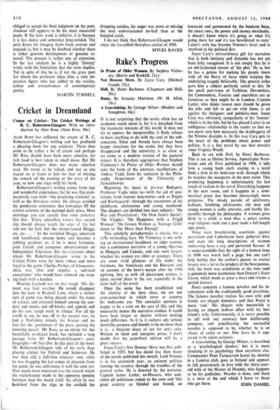Cricket in Dreamland
' duction by Alan Ross (Alan Ross, 36s.) ALAN Ross has collected the cream of R. C. Robertson-Glasgow's writing and has produced a pleasing book for any cricketer. There does seem to be rather a lot of cream and perhaps Mr Ross should have been more selective, for rich food is best taken in small doses. But Mr Robertson-Glasgow does not make selection easy. He wrote as he talked, and just as one stayed on to listen to him for fear of missing the remark of the evening or the story of the year, so now one stays with his book.
Robertson-Glasgow's writing comes from ripe and wonderful experiences, for he was that com- paratively rare bird—`the practising cricketer' as well as the first-class writer. He always avoided the ponderous utterances that nowadays fill the cricket columns of the national daily press. Most mornings you can usually find some pedantry like this : 'Every schoolboy knows that second slip should always watch the edge of the bat and not the ball, but the inexperienced Bloggs, etc. etc. . . .' So the wretched Bloggs, uncertain and humiliated, returns home and becomes a jobbing gardener or, if he is more fortunate, joins Lloyds and composes advertisements on Independent Television. But the cricketers about whom Mr Robertson-Glasgow wrote in his Cricket Prints were far more robust and more loyal to the game. Charles Parker, of Gloucester- shire, was 'slim and angular, a sad-eyed executioner' who would have silenced any carp- 't ing hack with a hatchet.
Maurice Leyland was no less tough. 'His ele- ment was foul weather. He would disappear into the haze at Braman Lane, where a sterner sort of game was being played under the name of cricket, and entrench himself among the saw- dust and smoke and off-breaks and appeals and do his raw, tough work in silence? For all the world to see, he was off to the nearest war; he had a Yorkshire remedy for bruises and no fear for the 'gentlemen of the press, poising the knowing pencil.' Mr Ross, as an entree for this beautifully produced book, has included a long passage from Mr Robertson-Glasgow's auto- biography-46 Not Out. In this part of the book Mr Robertson-Glasgow tells of his early days playing cricket for Oxford and Somerset. He was then still a full-time cricketer and, while he was dragging the last ounce of pleasure from the game, he was enlivening it with his own wit. How much more important was the remark which the wicketkeeper made to the opposing opening batsman than the match itself. So, when he was banished from the slips to the outfield for dropping catches, his anger was more at missing the next conversational no-ball than at the bungled catch.
I do not think that Robertson-Glasgow would enjoy the (so-called) first-class cricket of 1966. MYLES RAVEN






























 Previous page
Previous page